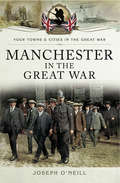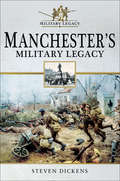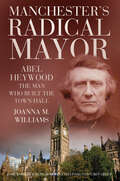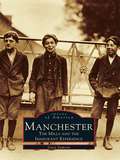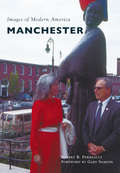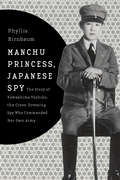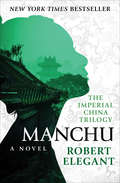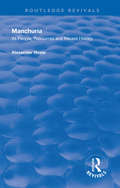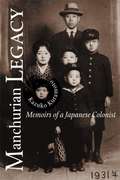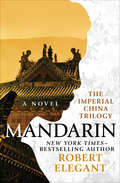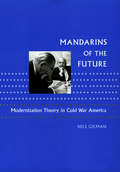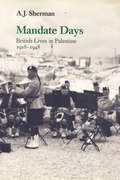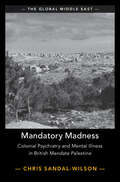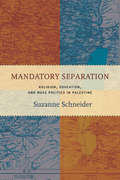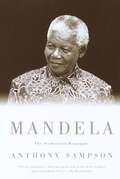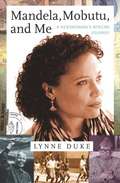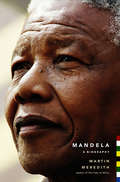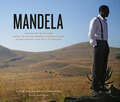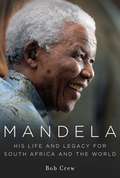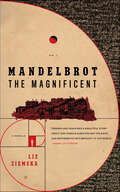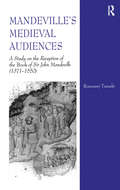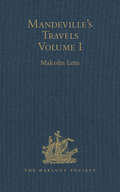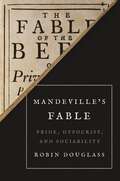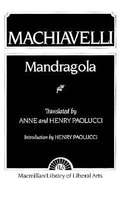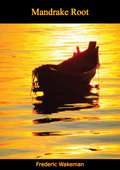- Table View
- List View
Manchester in the Great War (Your Towns & Cities in the Great War)
by Joseph O'NeillHow the experience of war impacted on the town, from the initial enthusiasm for sorting out the German kaiser in time for Christmas 1914, to the gradual realization of the enormity of human sacrifice the families of Manchester were committed to as the war stretched out over the next four years. A record of the growing disillusion of the people, their tragedies and hardships and a determination to see it through. Manchester was more profoundly involved in the Great War than any provincial city. Manchester men volunteered in greater numbers than any others; its women, hardened to the rigours of factory life, flooded into munitions and engineering workshops and toiled long hours while contending with cruel shortages. Children's lives were disrupted as schools became hospitals and the city developed into a major centre for treating the wounded. A great port, an industrial powerhouse, the region's commercial and distribution centre, Manchester overcame hunger and deprivation to become the engine that drove an exhausted and impoverished nation to an unlikely victory.
Manchester's Military Legacy (Military Legacy)
by Steven DickensThe establishment of the Roman fort of Mamucium in AD79 is the first known record of any military construction, or presence, in the area that is now the Castlefield district of the city. The Roman auxiliary units posted here used the fort as a garrison, located at Mamucium for the purpose of protecting the Roman road from Chester (Deva Victrix) to York (Eboracum). The site was previously occupied, as a defensive hill fort, by the ancient Britons, or Brigantes, who were native to the area.The next epoch of military activity at Manchester occurred in the Civil War and the Siege of Manchester in 1642. Manchesters declaration as a Parliamentarian town had far-reaching consequences, in terms of its military legacy, on the voting rights of Mancunians. Upon his restoration Charles II removed Manchesters two MPs from Parliament and Manchester was not to receive any political representation until the Reform Act of 1832.The Peterloo Massacre, of August 1819, was the scene of a mass rally brought about by a desire to repeal the Corn Laws, introduce universal suffrage and reform other repressive legislation. The cavalry charge which resulted in the deaths of an estimated eighteen innocent protesters and the wounding of over 500, took place at St. Peters Field (now Square) in the heart of the city. Its legacy resulted in the establishment of the Manchester Guardian and the rise of radical freethinking in the city, not always welcomed by those in authority.Both World Wars have had a profound influence on the city. The establishment of the Manchester Regiment is detailed and later the Manchester Pals are recalled through the pages of the local press. Heaton Park became their base, whilst General Kitchener visited the city, in order to boost recruitment. Later the Luftwaffes bombing campaign of December 1940, the Manchester Blitz, left the city with a legacy that has changed it beyond all recognition into the twenty-first century.
Manchester's Radical Mayor: Abel Heywood, The Man who Built the Town Hall
by Jeremy Roberts Joanna M. WilliamsKnown in his day as the man who built the Town Hall, Abel Heywood was a leading Manchester publisher who entertained royalty at his home and twice became Mayor of Manchester. Yet before he found success his life was one of poverty and hardship, marked by a prison term in his pursuit of a free press. A campaigner for votes for all and social reform, Heywood attempted to enter Parliament twice, but his working-class origins and radical ideas proved an insurmountable obstacle. As councillor, alderman and mayor, he worked passionately and tirelessly to build the road, railway and tram systems, develop education, improve the provision of hospitals, museums and libraries, better the living conditions of the poor, and make Manchester a great city. Going beyond the experiences of one man, this book explores the wider political, cultural and class context of the Victorian city. It is an honest tale of rags to riches that will appeal to all who wish to discover more about the dramatic history of industrial Manchester and its people.
Manchester: The Mills and the Immigrant Experience
by Gary SamsonThis fascinating and moving book brings to life the industrial and immigrant experience which gave birth to Manchester in the nineteenth century and continued to shape the city's destiny well into the twentieth century. More than a hundred years ago, thousands of immigrants from Europe and Canada were drawn to the mills of Manchester by the promise of a better life. In stirring photographs and text, Manchester: The Mill and the Immigrant Experience examines the aspirations, the struggles, and the everyday adventures of Manchester's immigrant families. Reaffirming the power of photography to move and inform us, Manchester: The Mills and the Immigrant Experience creates a vivid picture of life during nearly a century of rapid industrial change. We join the bustle of Elm and Hanover Streets in the 1880s, witness children working at the mighty Amoskeag Manufacturing Company, enter a Greek coffeehouse in the early 1900s, get caught up in the bitter labor strikes of the 1920s, and meet unusual local figures such as the Hermit of Mosquito Pond.
Manchester: Vivre La Difference (Images of Modern America)
by Gary Samson Robert B. PerreaultKnown as New Hampshire�s �Queen City,� Manchester could be called �Change City.� Throughout its history, it has reinvented itself many times. From a Native American fishing and gathering place called Amoskeag to a Yankee colonial town known as Derryfield, it became a multiethnic industrial center, the �Manchester of America,� home of the world-famous Amoskeag Manufacturing Company (1831�1936). When Amoskeag Manufacturing closed during the Depression, �the city that would not die� was reborn through more diversified industries that carried it through the post�World War II era. Several decades of urban renewal saw the demolition of many older buildings and entire neighborhoods. Lamenting the loss of Boston & Maine Railroad�s Union Station and St. Mary�s Bank�s marble building, Manchester residents drew inspiration from the US bicentennial in 1976 to create a renaissance of interest in history and architecture, which brought about the adaptation to modern use of several remaining older structures. Yet more major losses came in 1978 and 1989 with the destruction of the State Theatre and Manchester�s beloved Notre Dame Bridge.
Manchu Princess, Japanese Spy
by Phyllis BirnbaumAisin Gioro Xianyu (1907--1948) was the fourteenth daughter of a Manchu prince and a legendary figure in China's bloody struggle with Japan. After the fall of the Manchu dynasty in 1912, Xianyu's father gave his daughter to a Japanese friend who was sympathetic to his efforts to reclaim power. This man raised Xianyu, now known as Kawashima Yoshiko, to restore the Manchus to their former glory. Her fearsome dedication to this cause ultimately got her killed.Yoshiko had a fiery personality and loved the limelight. She shocked Japanese society by dressing in men's clothes and rose to prominence as Commander Jin, touted in Japan's media as a new Joan of Arc. Boasting a short, handsome haircut and a genuine military uniform, Commander Jin was credited with various daring exploits, among them riding horseback as leader of her own army during the Japanese occupation of China.While trying to promote the Manchus, Yoshiko supported the puppet Manchu state established by the Japanese in 1932, which became one of the reasons she was executed for treason after Japan's 1945 defeat. The truth of Yoshiko's life is still a source of contention between China and Japan -- some believe she was exploited by powerful men, others claim she relished her role as political provocateur. China holds her responsible for unspeakable crimes, while Japan has forgiven her transgressions. This biography presents the most accurate and colorful portrait to date of the controversial princess spy, recognizing her truly novel role in conflicts that transformed East Asia.
Manchu: A Novel (The Imperial China Trilogy #1)
by Robert ElegantNew York Times Bestseller: This epic novel of the conquest of the Ming dynasty &“does for 17th-century China what James Clavell&’s Shogun did for 16th-century Japan&” (The Christian Science Monitor). Francis Arrowsmith is a man without a country, a soldier-of-fortune in search of a war. An English orphan raised in France by exiled Jesuits, he hopes to make a quick pile out of his rare skills in building and operating artillery. Little does he know that when he joins a Portuguese expedition to aid the decadent and corrupt Ming dynasty in its fight against the Manchu invaders, he is embarking on a journey that will merge his destiny with the fate of China itself. From the opulent courts of the emperors to bloody battlefields, author Robert Elegant employs his deep knowledge and love of China to create a richly detailed world of dangers and delights, where the quest for power and pleasure drives men and women to extremes of both loyalty and betrayal. Manchu is the compellingly vivid story of an empire in its last agonies and the people caught up in its fateful drama by the Edgar Award–winning author of Mandarin and Dynasty.
Manchuria: Its People, Resources and Recent History (Routledge Revivals)
by Alexander HosieFirst published in 1901, this volume emerged in the aftermath of the Russian invasion of Manchuria. Its author had been in charge of the British Consulate at Newchwang in Manchuria for two periods between 1894 and 1900. The book contains an account of journeys in Eastern and Northern Manchuria, followed by chapters on recent events in Manchuria along with its climate, people, administration and industry.
Manchurian Legacy: Memoirs of a Japanese Colonist
by Kazuko Kuramoto<p>Kazuko Kuramoto was born and raised in Dairen, Manchuria, in 1927, at the peak of Japanese expansionism in Asia. Dairen and the neighboring Port Arthur were important colonial outposts on the Liaotung Peninsula; the train lines established by Russia and taken over by the Japanese, ended there. When Kuramoto's grandfather arrived in Dairen as a member of the Japanese police force shortly after the end of the Russo-Japanese War in 1905, the family's belief in Japanese supremacy and its "divine" mission to "save" Asia from Western imperialists was firmly in place. As a third-generation colonist, the seventeen-year-old Kuramoto readily joined the Red Cross Nurse Corps in 1944 to aid in the war effort and in her country's sacred cause. A year later, her family listened to the emperor's radio broadcast ". . . we shall have to endure the unendurable, to suffer the insufferable." Japan surrendered unconditionally. <p>Manchurian Legacy is the story of the family's life in Dairen, their survival as a forgotten people during the battle to reclaim Manchuria waged by Russia, Nationalist China, and Communist China, and their subsequent repatriation to a devastated Japan. Kuramoto describes a culture based on the unthinking oppression of the colonized by the colonizer. And, because Manchuria was, in essence, a Japanese frontier, her family lived a freer and more luxurious life than they would have in Japan—one relatively unscathed by the war until after the surrender. <p>As a commentator Kuramoto explores her culture both from the inside, subjectively, and from the outside, objectively. Her memoirs describe her coming of age in a colonial society, her family's experiences in war-torn Manchuria, and her "homecoming" to Japan—where she had never been—just as Japan is engaged in its own cultural upheaval.</p>
Mandarin: A Novel (The Imperial China Trilogy #2)
by Robert ElegantA grand tale of intrigue in nineteenth-century China, where imperial rule is crumbling as the Opium Wars and Taiping Rebellion rage, from the author of Manchu. Loyalty is put to cruel test in Shanghai, where Jewish merchant Saul Haleevie and his longtime Chinese partner, Aisek Lee, have weathered hardship and distrust to build a thriving business. When Aisek is falsely accused of &“abomination&” for causing his mother&’s suicide, their world is shattered. Now, Saul must save his friend no matter the cost, navigating a brutal and corrupt penal system that could bring about his own ruin as well. Meanwhile, the quest for true love governs the fate of Saul&’s wayward daughter, Fronah. Consorting with the Westerners now thronging Shanghai but truly comfortable only in her Jewish-Asiatic identity, she ends up destroying one man and confounding another. Love and deception also entwine in the imperial palace, where the &“Virtuous Concubine&” Yehenala contrives to bear the opium-eating, syphilitic Hsien Feng emperor&’s only son, thus laying the foundation for her elevation to the pinnacle of command in China as the formidable empress dowager. She wins the power battle, but it is beyond her to win the war, for by then China faces not just the collapse of another imperial dynasty, but the end of the millennial imperial system of rule, threatening the lives and loves of all. This compelling saga of nineteenth-century China is filled with &“intricate shuttlecock diplomacy, ceremonial/battle action, family saga/romance—all polished to an entertaining high gloss&” (Kirkus Reviews).
Mandarins of the Future: Modernization Theory in Cold War America (New Studies in American Intellectual and Cultural History)
by Nils GilmanBecause it provided the dominant framework for "development" of poor, postcolonial countries, modernization theory ranks among the most important constructs of twentieth-century social science. In Mandarins of the Future: Modernization Theory in Cold War America Nils Gilman offers the first intellectual history of a movement that has had far-reaching and often unintended consequences.After a survey of the theory's origins and its role in forming America's postwar sense of global mission, Gilman offers a close analysis of the people who did the most to promote it in the United States and the academic institutions they came to dominate. He first explains how Talcott Parsons at Harvard constructed a social theory that challenged the prevailing economics-centered understanding of the modernization process, then describes the work of Edward Shils and Gabriel Almond in helping Parsonsian ideas triumph over other alternative conceptions of the development process, and finally discusses the role of Walt Rostow and his colleagues at M.I.T. in promoting modernization theory during the Kennedy and Johnson administrations. By connecting modernization theory to the welfare state liberalism programs of the New Deal order, Gilman not only provides a new intellectual context for America's Third World during the Cold War, but also connects the optimism of the Great Society to the notion that American power and good intentions could stop the postcolonial world from embracing communism.
Mandate Days: British Lives in Palestine 1918-1948
by A. J. Sherman"An essential purchase for anyone interested in modern Middle East history." --Jerusalem Post The strife-torn three decades of British rule over Palestine, known as the Mandate, is one of the great dramas in British imperial history, and remains passionately controversial now, some fifty years after the last British High Commissioner left Jerusalem. British policies, promises, the mere presence of Britain in the Holy Land, are all still argued, deplored, or--less frequently--admired. In all the polemic surrounding the Mandate, the thousands of British men and women who actually lived and worked in Palestine have been overlooked, as if their presence there had been irrelevant. Whether civil servants, teachers, soldiers, or missionaries, posted to Jerusalem or remote outposts in the hills, whatever their rank or tasks, the British of the Mandate lived through an extraordinary, transforming personal adventure. Here for the first time is their often poignant story, written largely in their own words, with honesty, humor, and occasional bitterness, against a background of tragic and violent events. Their letters home, diaries, and memoirs vividly describe British landscapes, cultural affinities and misunderstandings, feelings for Arabs or Jews, accomplishments and mishaps, and a strong sense of imperial mission coupled with an often sorrowful awareness of human limitations and the folly of unrealistic expectations. This powerful and authentic personal writing, enhanced by evocative illustrations, brings to life a notable chapter in imperial history and illuminates the experiences and motivations of the last, remarkably articulate generation of British proconsuls and their wives.
Mandatory Madness: Colonial Psychiatry and Mental Illness in British Mandate Palestine (The Global Middle East)
by Chris Sandal-WilsonMandatory Madness offers a new perspective on a pivotal period in the history of modern Palestine, by putting mental illness and the psychiatric encounters it engendered at the heart of the story. Through a careful and creative reading of an eclectic mix of archival and published material, Mandatory Madness reveals how a range of actors - British colonial officials, Zionist health workers, Arab doctors and nurses, and Palestinian families - responded to mental illness in the decades before 1948. Rather than a concern of European Jewish psychiatric experts alone, questions around the causes, nature, and treatment of mental illness were negotiated across diverse and sometimes surprising sites in mandate Palestine: not only in underfunded and overcrowded government mental hospitals and private Jewish clinics, certainly, but also in family homes and neighbourhood streets, in colonial courtrooms and prisons and census offices, and in the itineraries of shaykhs and patients alike as they crossed newly drawn borders within the Levant. Bringing together histories of medicine, colonialism, and the modern Middle East, Mandatory Madness highlights how the seemingly personal and private matter of mental illness generated distinctive forms of entanglement: between colonial state and society, Arabs and Jews, and Palestine and the wider region.
Mandatory Separation: Religion, Education, And Mass Politics In Palestine
by Suzanne SchneiderIs religion a source of political stability and social continuity, or an agent of radical change? This question, so central to contemporary conversations about religion and extremism, has generated varied responses over the last century. Taking Jewish and Islamic education as its objects of inquiry, Mandatory Separation sheds light on the contours of this debate in Palestine during the formative period of British rule, detailing how colonial, Zionist, and Palestinian-Muslim leaders developed competing views of the form and function of religious education in an age of mass politics. Drawing from archival records, school syllabi, textbooks, newspapers, and personal narratives, Suzanne Schneider argues that the British Mandatory government supported religious education as a supposed antidote to nationalist passions at the precise moment when the administrative, pedagogic, and curricular transformation of religious schooling rendered it a vital tool for Zionist and Palestinian leaders. This study of their policies and practices illuminates the tensions, similarities, and differences among these diverse educational and political philosophies, revealing the lasting significance of these debates for thinking about religion and political identity in the modern Middle East.
Mandela
by Anthony SampsonNelson Mandela, who emerged from twenty-six years of political imprisonment to lead South Africa out of apartheid and into democracy, is perhaps the world's most admired leader, a man whose life has been led with exemplary courage and inspired conviction.Now Anthony Sampson, who has known Mandela since 1951 and has been a close observer of South Africa's political life for the last fifty years, has produced the first authorized biography, the most informed and comprehensive portrait to date of a man whose dazzling image has been difficult to penetrate. With unprecedented access to Mandela's private papers (including his prison memoir, long thought to have been lost), meticulous research, and hundreds of interviews--from Mandela himself to prison warders on Robben Island, from Walter Sisulu and Oliver Tambo to Winnie Mandela and F. W. de Klerk, and many others intimately connected to Mandela's story--Sampson has composed an enlightening and necessary story of the man behind the myth.From the Trade Paperback edition.
Mandela, Mobutu, and Me: A Newswoman's African Journey
by Lynne DukeIn this stunning memoir, veteran Washington Post correspondent Lynne Duke takes readers on a wrenching but riveting journey through Africa during the pivotal 1990s and brilliantly illuminates a continent where hope and humanity thrive amid unimaginable depredation and horrors. For four years as her newspaper's Johannesburg bureau chief, Lynne Duke cut a rare figure as a black American woman foreign correspondent as she raced from story to story in numerous countries of central and southern Africa. From the battle zones of Congo-Zaire to the quest for truth and reconciliation in South Africa; from the teeming displaced person's camps of Angola and the killing field of the Rwanda genocide to the calming Indian Ocean shores of Mozambique. She interviewed heads of state, captains of industry, activists, tribal leaders, medicine men and women, mercenaries, rebels, refugees, and ordinary, hardworking people. And it is they, the ordinary people of Africa, who fueled the hope and affection that drove Duke's reporting. The nobility of the ordinary African struggles, so often absent from accounts of the continent, is at the heart of Duke's searing story. MANDELA, MOBUTU, AND ME is a richly detailed, clear-eyed account of the hard realities Duke discovered, including the devastation wrought by ruthless, rapacious dictators like Mobutu Sese Seko and his successor, Laurent Kabila, in the Congo, and appalling indifference of Europeans and Americans to the legacy of their own exploitation of the continent and its people. But Duke also records with admiration the visionary leadership and personal style of Nelson Mandela in south Africa as he led his country's inspiring transition from apartheid in the twilight of his incredible life. Whether it was touring underground gold and copper mines, learning to carry water on her head, filing stories by flashlight or dodging gunmen, Duke's tour of Africa reveals not only the spirit and travails of an amazing but troubled continent -- it also explores the heart and fearlessness of a dedicated journalist.
Mandela: A Biography
by Martin MeredithNelson Mandela stands out as one of the most admired political figures of the twentieth century. It was his leadership and moral courage above all that helped to deliver a peaceful end to apartheid in South Africa after years of racial division and violence and to establish a fledgling democracy there.Martin Meredith's vivid portrayal of this towering leader was originally acclaimed as "an exemplary work of biography: instructive, illuminating, as well as felicitously written” (Kirkus Reviews), providing "new insights on the man and his time” (Washington Post). Now Meredith has revisited and significantly updated his biography to incorporate a decade of additional perspective and hindsight on the man and his legacy and to examine how far his hopes for the new South Africa have been realised.Published as South Africa celebrates 100 years since its founding and hosts the 2010 World Cup, Nelson Mandela is the most thorough and up-to-date account available of the life of its most revered hero.
Mandela: A Film and Historical Companion
by Keith BernsteinThis official companion book to the epic major feature film Mandela: Long Walk to Freedom retraces the life of Nelson Mandela, weaving together his own words and historic humanitarian efforts with cinematic narrative and exclusive behind-the-scenes content. It's a movie tie-in unlike any other: a combination of dramatic recreations and history, featuring film stills alongside archival photographs of actual events; commentary from the acclaimed cast and filmmakers plus interviews with Mandela's own family and comrades; excerpts from his books and personal papers, with lush, full-color panoramas of the South African landscapes where the film was shot on location. Fans of the movie and Mandela admirers, whatever their age, will relish this unique look at the making of an epic motion picture and the life of a beloved historical icon.
Mandela: His Life and Legacy for South Africa and the World
by Bob CrewNelson Mandela is known worldwide as a great moral and political leader, the first democratically elected South African president, the recipient of a Nobel Peace Prize, and a beacon of interracial goodwill. In Mandela, former foreign correspondent Bob Crew demystifies the icon and his legacy. After over a decade of travels in South Africa, Crew seeks truth in the unexpected details of the lives of Mandela and current South African president Jacob Zuma, comparing them to other world icons in order to bring a new understanding of their legacies to Western readers.Mandela presents a wealth of information, including character studies of Mandela and Zuma, the historical social background of South Africa, and the effect Zuma has had on the racially divided country. Crew uses his own reflections and insights as well as interviews with many South Africans to color his analysis of historical and current events. This book is a seasoned view of the history and politics of a country that produced one of the most iconic leaders of the world, who wished more than anything else for peace.
Mandelbrot the Magnificent: A Novella
by Liz Ziemska"Liz Ziemska has fashioned a beautiful story about one famous survivor and the magic and mathematics he&’s brought to the world." —Karen Joy FowlerMandelbrot the Magnificent is a stunning, magical pseudo-biography of Benoit Mandelbrot as he flees into deep mathematics to escape the rise of Hitler Born in Warsaw and growing up in France during the rise of Hitler, Benoit Mandelbrot found escape from the cruelties of the world around him through mathematics. Logic sometimes makes monsters, and Mandelbrot began hunting monsters at an early age. Drawn into the infinite promulgations of formulae, he sinks into secret dimensions and unknown wonders. His gifts do not make his life easier, however. As the Nazis give up the pretense of puppet government in Vichy France, the jealousy of Mandelbrot&’s classmates leads to denunciation and disaster. The young mathematician must save his family with the secret spaces he&’s discovered, or his genius will destroy them.
Mandeville's Medieval Audiences: A Study on the Reception of the Book of Sir John Mandeville (1371-1550)
by Rosemary TzanakiThe so-called travels of Sir John Mandeville to the Holy Land, India and Cathay were immensely popular throughout Europe during the late medieval period and were translated into nine different languages. This is a detailed study of the audiences of Mandeville's Book, with particular emphasis on its reception in England and France from the time the Book appeared in the 1350s to the mid-16th century. The multiple ways in which audiences interpreted the work, depending on wider social and cultural contexts, are analysed thematically, under the headings of pilgrimage, geography, romance, history and theology, and contrasted with what can be learned of the author's intentions. The book is well-illustrated with images taken from both manuscript and early printed editions: in her study of these and the marginal notes, Rosemary Tzanaki shows their importance for seeing what readers found of interest. Her analysis makes a significant contribution to our understanding of how people in medieval Europe perceived the outside world.
Mandeville's Travels: Texts and Translations, Volumes I & II (Hakluyt Society, Second Series #101)
by Malcolm LettsThe text of British Library Egerton MS 1982, with an essay on the cosmographical ideas of Mandeville's day by E. G. R. Taylor. The main pagination of this and the following volume (Second Series 102) is continuous. This is a new print-on-demand hardback edition of the volume first published in 1953.
Mandeville’s Fable: Pride, Hypocrisy, and Sociability
by Dr Robin DouglassWhy we should take Bernard Mandeville seriously as a philosopherBernard Mandeville&’s The Fable of the Bees outraged its eighteenth-century audience by proclaiming that private vices lead to public prosperity. Today the work is best known as an early iteration of laissez-faire capitalism. In this book, Robin Douglass looks beyond the notoriety of Mandeville&’s great work to reclaim its status as one of the most incisive philosophical studies of human nature and the origin of society in the Enlightenment era. Focusing on Mandeville&’s moral, social, and political ideas, Douglass offers a revelatory account of why we should take Mandeville seriously as a philosopher.Douglass expertly reconstructs Mandeville&’s theory of how self-centred individuals, who care for their reputation and social standing above all else, could live peacefully together in large societies. Pride and shame are the principal motives of human behaviour, on this account, with a large dose of hypocrisy and self-deception lying behind our moral practices. In his analysis, Douglass attends closely to the changes between different editions of the Fable; considers Mandeville&’s arguments in light of objections and rival accounts from other eighteenth-century philosophers, including Shaftesbury, Hume, and Smith; and draws on more recent findings from social psychology.With this detailed and original reassessment of Mandeville&’s philosophy, Douglass shows how The Fable of the Bees—by shining a light on the dark side of human nature—has the power to unsettle readers even today.
Mandragola
by Niccolo Machiavelli Anne Paolucci Henry PaolucciWritten somewhere between 1512 and 1520, this is a comedic play in which a love stuck young man tries to win the affections of the young, beautiful wife of an old doctor.
Mandrake Root
by Frederic WakemanThis is the story of two journeys. The first is the cruise of the sailing yacht Cybele. The second is the journey into a woman’s past. After ten years of marriage, Roger and Emily Stratton decide on a second honeymoon. He is a writer and has bought a tiny sailing yacht for a Caribbean cruise.A few days out of port they are anchored off an uninhabited island when the scheme begins to rumble around in Roger’s mind: Perhaps, even after ten years of marriage, there is a way, some way, to make his and Emily’s love what he has always dreamed it would be.Three days later they go ashore and Roger broaches his plan to Emily:“Suppose you and I pledge each other to tell the complete and utter truth, including all our past, good, bad or heretofore unspeakable,” he said. “Suppose we spend the rest of this cruise prying and probing into every past act no matter how reprehensible...no matter how hurtful or deadly or disgusting it seems at the time....If we really do a full job, in complete honesty with each other, I believe with all my heart that we can build ourselves the finest love any couple could want.”Emily agrees. She believes her behaviour has been no better or worse than that of any of the other women in her circle who pride themselves on their civilized sophistication. Nor does she have any idea of just how much she has to hide, or of what she will finally be driven to reveal. In her innocence, she adds to Roger’s plan with the suggestion that their confessions will be wonderful material for his next novel.In MANDRAKE ROOT, Frederic Wakeman tells a story which reaches to the heart of many, many marriages. His novel is a mature and painstaking consideration of what went wrong in a marriage and how two people tried to save their failure.“Why anyone would read the Kinsey Report when this is available passes understanding.”—Pasadena Star-News
